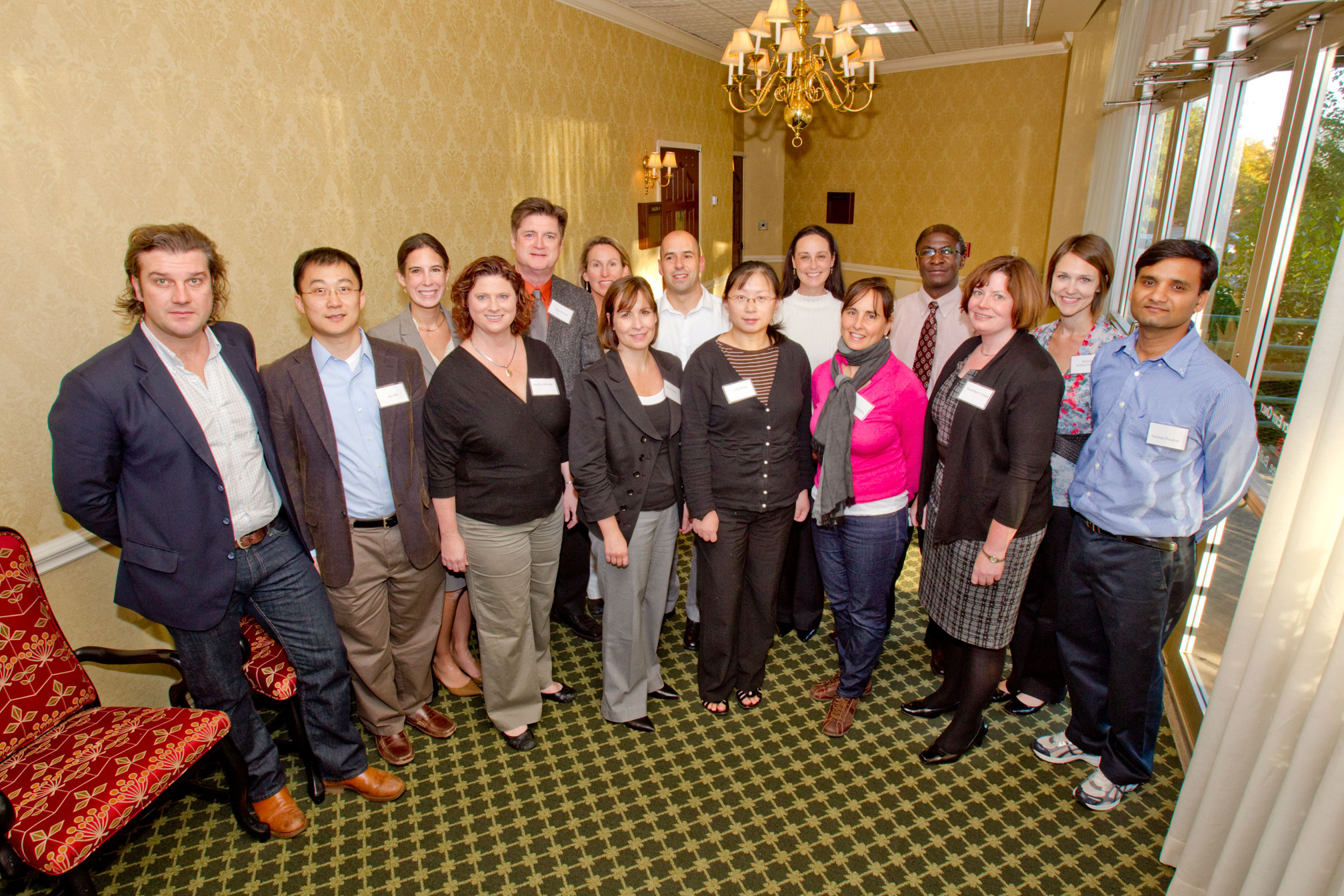The metaphor wasn’t lost on Paige Carmichael. When she joined about two dozen other faculty members on the UGA Challenge Course for one of the first meetings of the new Teaching Academy Fellows program, she immediately drew the connection between the obstacles they had to overcome on the course and the hurdles faced by early-career faculty members.
“Going out on the ropes course was not my idea of fun, but it was wonderful. Here we had faculty members who’ve been named Meigs Professors and won other awards interacting on the intramural fields with brand-spanking new instructors and making themselves a team,” said Carmichael, a coordinator of the program and associate dean for academic affairs in the College of Veterinary Medicine. “It was a great learning experience for all of us.”
The Teaching Academy Fellows program links early-career faculty with seasoned mentors. Small groups of four or five early-career faculty members from diverse disciplines meet regularly with two Teaching Academy members to discuss topics both broad (those related to being a member of the UGA community), and deep (those relating to the university’s instructional mission).
“One of the main goals of the UGA Teaching Academy is to foster a community of teaching scholars,” said Josef Broder, chair of the academy’s executive committee and associate dean for academic affairs in the College of Agricultural and Environmental Sciences. “The Teaching Academy Fellows Program is designed to create this sense of community among our early-career teachers. The idea for the Fellows Program grew out a recommendation from the 2011 Academic Affairs Faculty Symposium.”
The entire group meets about five times during the year to hear guest speakers from the Teaching Academy and collaborate on projects. It’s currently running as a pilot program for the 2011-2012 academic year thanks to generous support from the provost’s office and PricewaterhouseCoopers.
“I’m partnered with Karen Cornell, who is a surgeon in the veterinary college. And in our group, we have informal gatherings where the topics range from time-management balancing in terms of multiple roles to working with graduate students to handling large classes to working with students when you’re an adviser to a student organization,” said Trish Kalivoda, a TAF program coordinator and senior associate vice president for public service and outreach. “What I really think is powerful about this format is that you get to hear the differences amongst the variety of disciplines, but also the similarities. You’re able to learn from each other and share stories. You leave each of these meetings re-energized about why we’re here as a university and the sense of responsibility and reward of working with students.”
The program’s relaxed atmosphere contributes to its appeal, said Belinda Stillion Southard, an assistant professor in the department of communication studies.
“I like how informal it is,” she said. “There are so many things you do at a university where you’re evaluated or tested on how you do, it’s nice to have something where that’s not the goal.”
Instead, the program measures success in terms of knowledge gained, time saved and relationships created, according to Mark Huber, a program coordinator and senior lecturer in the department of management information systems.
“In my mind, a successful program is one where, in a do-more-with-less environment, we would be able to shorten the learning curve of teaching at UGA,” Huber said. “If we cut the learning curve down, we’ve freed up more time for faculty to do those other things that the university expects them to do. For us, success is not only helping a new teacher, it’s also helping new faculty have more time to do more in all aspects of their academic career. They still have to get grants; they still have to do research; they still have to have lives. So if we’ve saved them an hour, that’s success.”
Nominated by deans and departments heads and selected by members of the Teaching Academy, 2011-12 fellows are Jennifer Atkinson, legal studies and real estate; Anna Marie Conner, mathematics education; Natasha Ganem, sociology;James Garrett, elementary and social studies; Timothy Gupton, Romance languages; Sonia Hernandez, forestry and natural resources; Bettina Love, elementary and social studies education; Bin Mei, forestry and natural resources; Shari Miller, social work; Nicolas Morrissey, art; David Okech, social work; Peter O’Neill, comparative literature; Neelam Poudyal, forestry and natural resources; Belinda Stillion Southard, communication studies; Nanette Spina, religion; Maria Viveiros, physiology and pharmacology; Lily Wang, statistics; Susan Wilde, forestry and natural resources; and Logan Sawyer, law.
The mentors are Paige Carmichael, veterinary medicine; Karen Cornell, veterinary medicine; Marcus Fechheimer, cellular biology; Christine Franklin, statistics; Nelson Hilton, Center for Teaching and Learning; Mark Huber, management information systems; Trish Kalivoda, public service and outreach; and Fran Teague, theatre and film studies.
ON THE WEB


